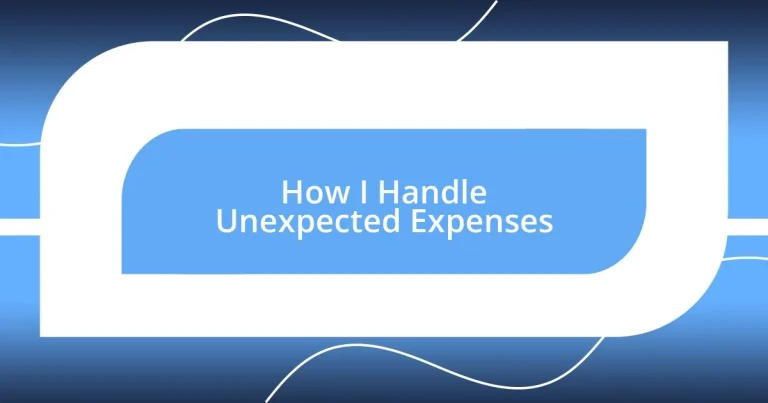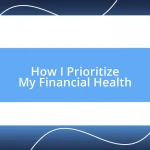Key takeaways:
- Recognizing and categorizing unexpected expenses is crucial for proactive financial planning and helps in maintaining a balanced budget.
- Creating and maintaining an emergency fund is essential for financial security against unexpected costs, ideally covering three to six months of living expenses.
- Regularly reviewing and adjusting your budget allows for better financial management, enabling you to accommodate unforeseen expenses seamlessly.
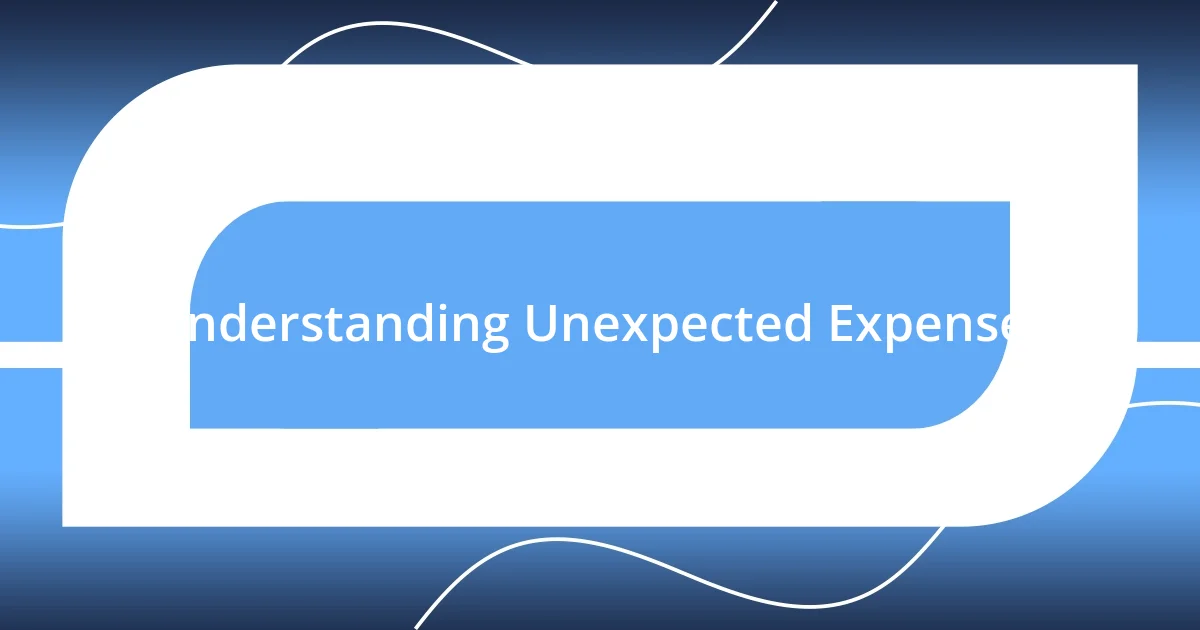
Understanding Unexpected Expenses
Unexpected expenses can feel like a sudden storm, catching us off guard and leaving us scrambling for shelter. I remember one time my car broke down in the middle of a busy week, forcing me to juggle my budget like a circus act. Have you ever felt that rush of panic when an urgent bill appears out of nowhere?
It’s essential to recognize that these financial surprises are a part of life. I’ve learned that each unexpected expense teaches me something valuable about my spending habits and priorities. Reflecting on my own experiences, those moments often reveal just how important it is to have a financial cushion for life’s little surprises.
When we talk about unexpected expenses, they can range from minor inconveniences, like a broken appliance, to major crises, like medical emergencies. I once faced a hefty hospital bill after a sudden illness, which forced me to reevaluate my savings strategy altogether. How do you prepare for these uninvited guests in your budget? Understanding their impact can help us approach our finances with a more proactive mindset.
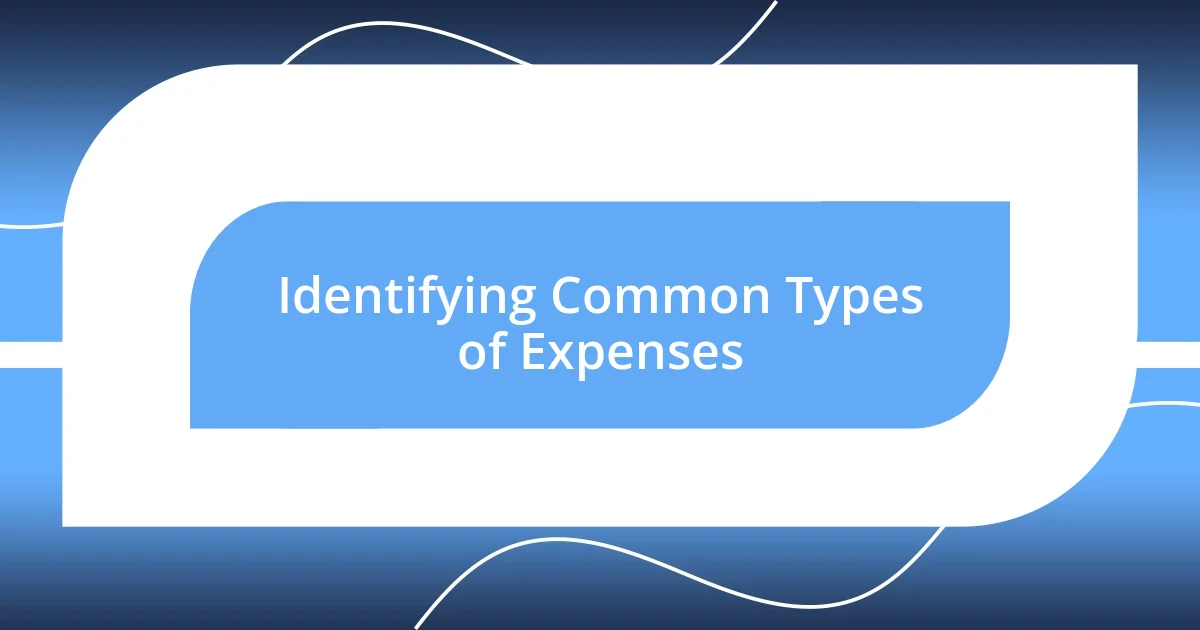
Identifying Common Types of Expenses
Identifying common types of unexpected expenses can be enlightening. For instance, home repairs often catch us by surprise—like the time I came home to discover a leaking pipe. The rush of water and the urgency of the situation made it clear that not all expenses can wait. Understanding these categories allows us to prepare better rather than simply react, transforming our financial strategy into a proactive endeavor.
Medical bills, too, are a significant source of unexpected costs. I vividly recall a dental emergency that required immediate treatment, leaving me not only in pain but also facing an unexpected charge. Moments like that have reinforced the reality that health-related expenses can never be fully anticipated, making it crucial to prioritize health savings in my financial planning. Recognizing these patterns helps me set aside specific funds for emergencies, easing the mental burden when they arise.
Lastly, transportation issues can create financial strain when least expected. I once had to replace a car battery on a busy Monday morning—it felt so frustrating to deal with the disruption of my day-to-day routine. A sudden breakdown can disrupt your finances just as much as your schedule, so categorizing these outlays helps me maintain a balanced budget. Each of these types of expenses contributes to a clearer picture of my financial health.
| Expense Type | Example |
|---|---|
| Home Repairs | Leaking Pipe |
| Medical Bills | Dental Emergency |
| Transportation Issues | Car Battery Replacement |
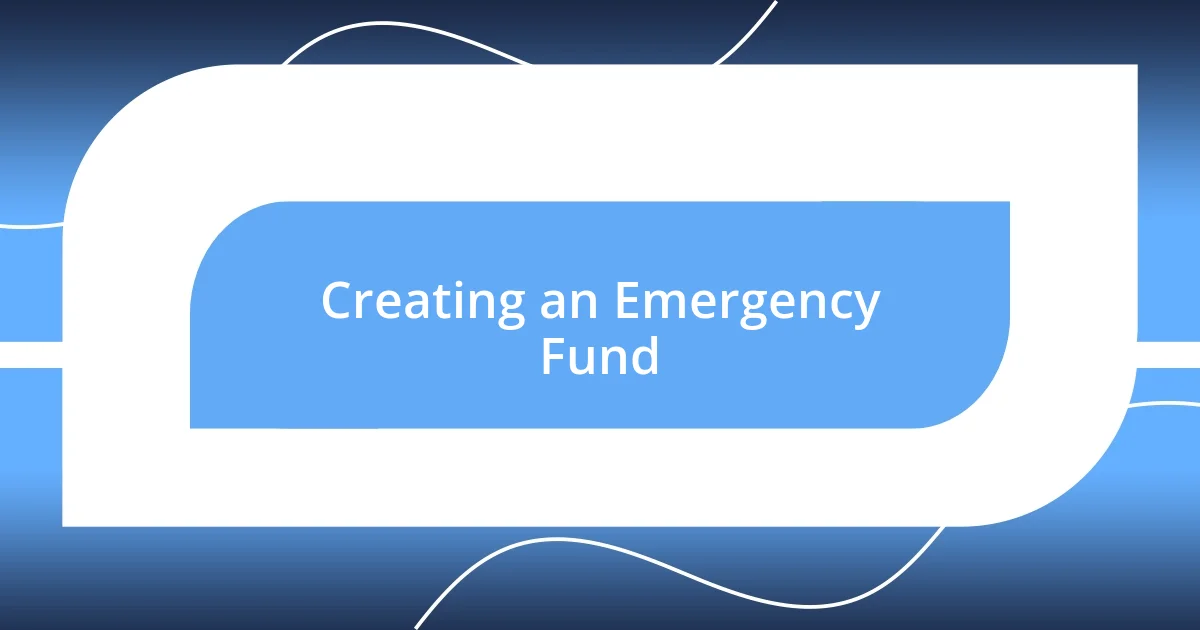
Creating an Emergency Fund
Creating an emergency fund has been a cornerstone of my financial resilience. A few years back, I found myself in a tight spot when an unexpected layoff hit my household. It dawned on me that having a financial cushion is not just convenient—it’s essential. I started setting aside a small portion of my income each month, which gave me a powerful sense of security. That fund has since protected me from those little shocks life throws our way.
To successfully build an emergency fund, I recommend considering the following steps:
- Determine Your Goal: Aim for at least three to six months’ worth of living expenses.
- Make it Automatic: Set up a direct deposit into your emergency fund each payday.
- Start Small: Even $20 a week can add up; it’s about consistent effort.
- Use a Separate Account: Keep your emergency funds in a high-yield savings account to earn interest while remaining accessible.
- Reassess Regularly: Life changes, and so should your savings goals—review them periodically.
By nurturing that fund, I’ve transformed what once felt like financial anxiety into empowered peace of mind. It’s a safety net that I know is there, allowing me to focus on life’s other joys without the constant worry of what might come next.
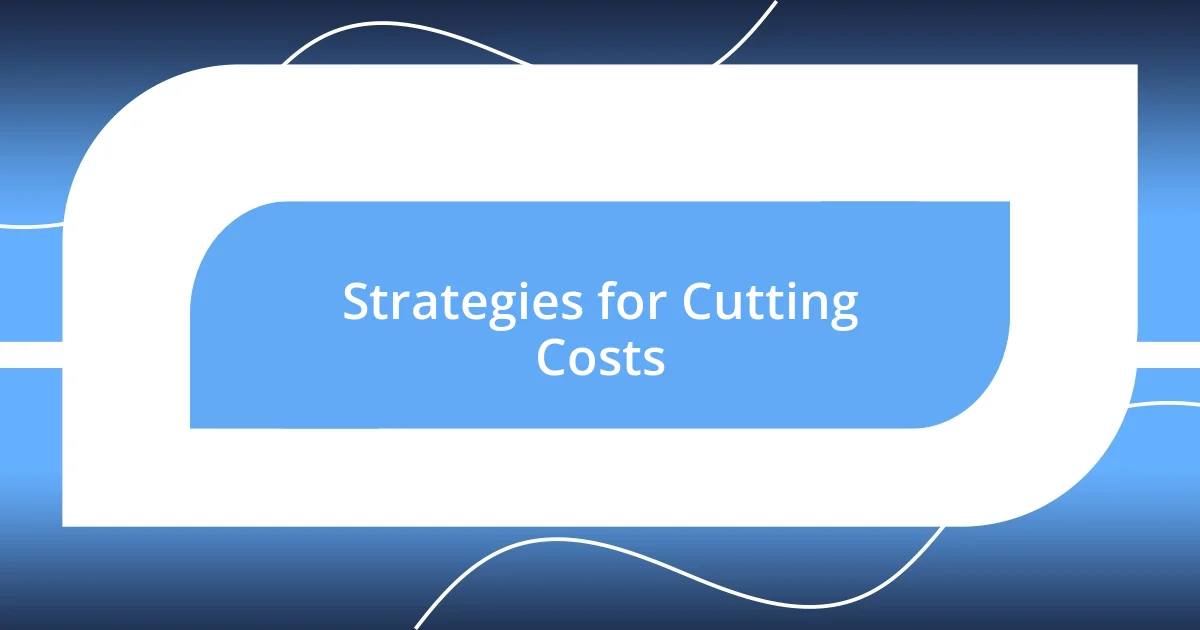
Strategies for Cutting Costs
When it comes to cutting costs, I often reflect on my own spending habits. One strategy that really worked for me was to analyze my discretionary spending. I used to enjoy dining out frequently—maybe too often! But when I realized how much those little meals added up, I started meal prepping on weekends. Not only did I save money, but I also rediscovered the joy of cooking at home. Have you ever tried making a favorite restaurant dish yourself? It can be a fun experiment and significantly lighter on your wallet.
Another method I found useful is to cancel unused subscriptions and memberships. I was shocked to realize I had several services I never used, like a gym membership from a New Year’s resolution long forgotten. It felt indicative of a common pitfall. So, I took the time to comb through my bank statements. To my surprise, deducting these unnecessary charges was a simple way to free up finances. Have you reviewed your subscriptions lately? You might find a few surprises waiting for you as well.
In addition, I’ve learned that shopping smartly can make a huge difference. When I faced unexpected car repairs last summer, I had to juggle my budget carefully. Instead of rushing to buy parts from expensive retailers, I decided to compare prices online and explore second-hand options. I found what I needed at a fraction of the cost. This experience taught me the importance of patience and research. It’s a simple yet effective reminder that being a savvy shopper can turn financial chaos into manageable solutions.
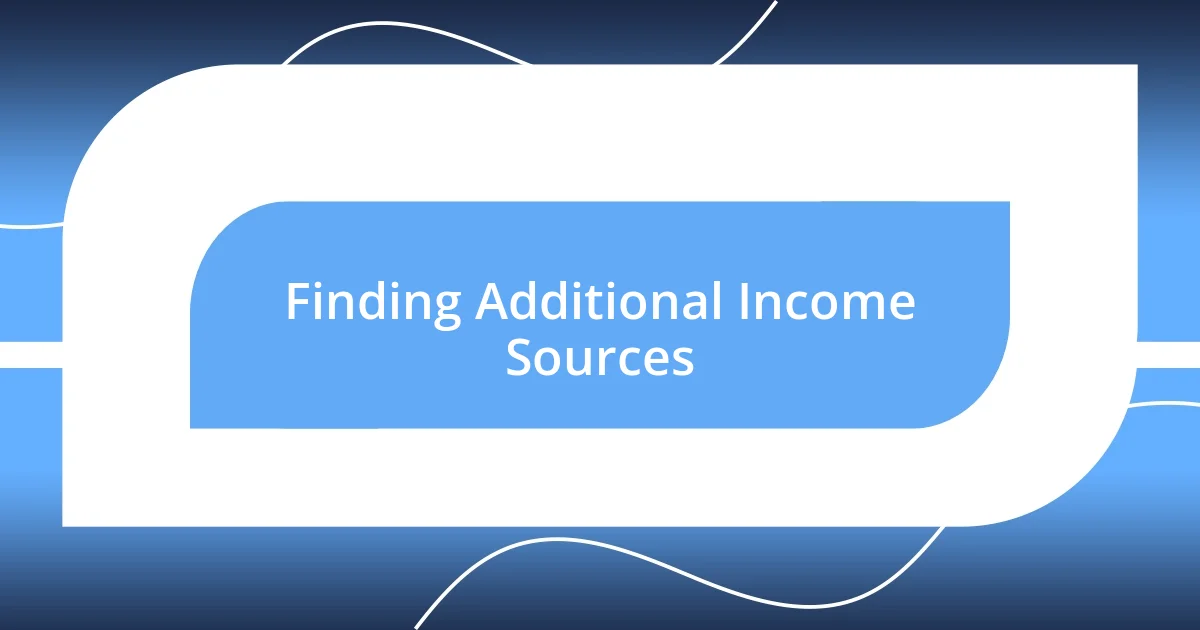
Finding Additional Income Sources
Finding Additional Income Sources
When I realized my budget needed a boost, exploring additional income sources became essential. I remember feeling a mix of excitement and apprehension when I took on freelance writing as a side gig. Not only did it help cushion unforeseen expenses, but it also reignited my passion for crafting words. Have you ever thought about turning a hobby into a side hustle? It can be quite fulfilling and lucrative.
Another avenue I explored was selling unused items around my home. Last spring, while decluttering, I stumbled across a box of old electronics that were gathering dust. I decided to list them online, and to my surprise, the sales added up quickly! It felt liberating to let go of things I no longer needed while simultaneously enhancing my finances. If you’ve got a collection of forgotten treasures, why not give it a try? You might be amazed at what others value.
I also ventured into the gig economy, dabbling in food delivery for a few evenings each week. The flexibility was a game-changer; I could earn extra cash on my terms. I vividly recall one night when I earned enough to cover an unexpected car repair—all while listening to my favorite podcast. It made me realize that creative solutions are often just around the corner. Would you consider trying out a gig? The possibilities might just surprise you!
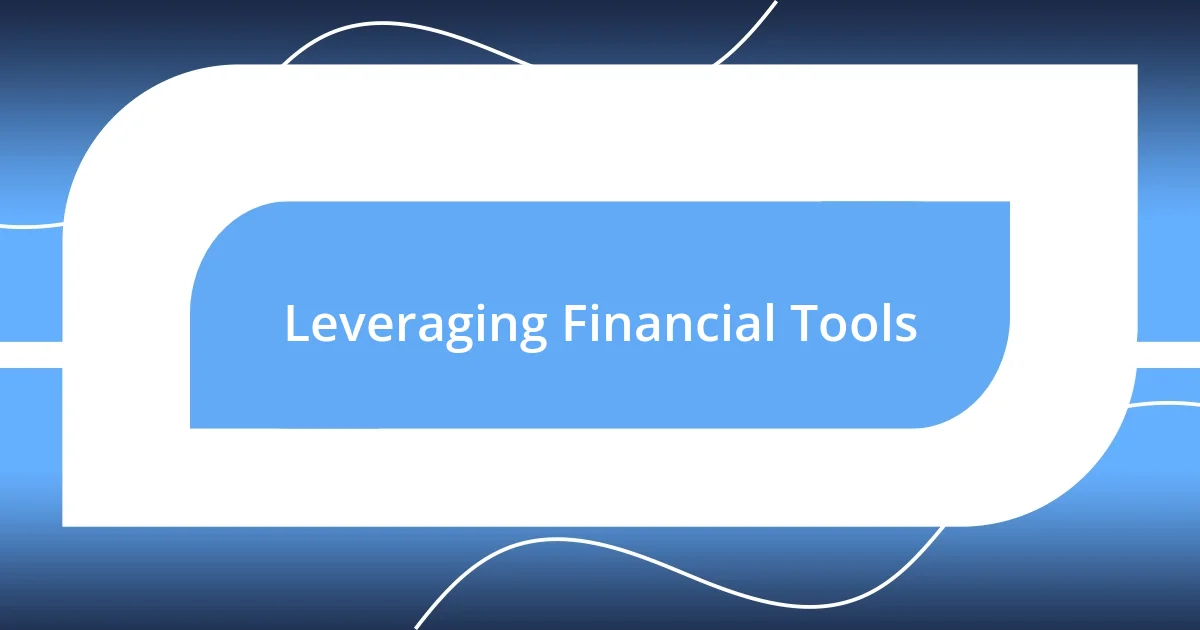
Leveraging Financial Tools
Leveraging financial tools has been a game-changer for me in handling unexpected expenses. For instance, I remember the first time I used budgeting apps to track my spending. It felt a bit overwhelming at first, but once I got the hang of it, I could see where my money was going in real-time. This clarity empowered me to adjust my habits immediately. Have you ever thought about using technology to fine-tune your finances? It can offer insights you might miss otherwise.
Another tool I’ve come to value is a high-yield savings account. When I started setting aside funds for emergencies, I put my money in an account that generates more interest than a typical one. I still recall the sense of relief I felt when I faced an unexpected vet bill last fall, knowing I had a little cushion to fall back on. If you aren’t using a high-yield savings option, I’d recommend looking into it—who doesn’t want their money to work harder for them?
Lastly, I can’t stress the importance of credit cards with rewards programs. Once I navigated through the initial confusion of selecting the right one, I found that my everyday purchases could earn me points for travel or cashback. Just last month, I redeemed some rewards for a small getaway after covering a last-minute home repair. It’s incredible how daily spending can turn into a benefit if you play your cards right—literally! Have you explored reward options tied to your spending? You might be surprised at how much they can help cushion your financial surprises.
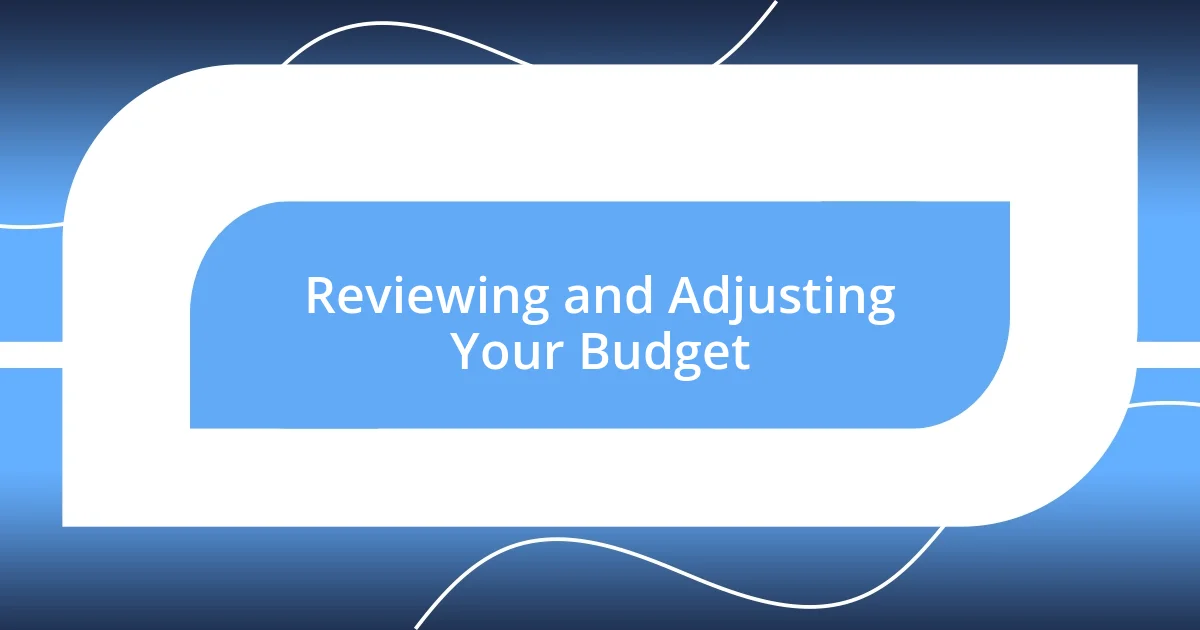
Reviewing and Adjusting Your Budget
Reviewing and adjusting your budget is a necessity that I’ve learned over time. I recall a time when I got hit with an unexpected medical bill that threw my budget into chaos. Instead of panicking, I sat down with my spreadsheet, scrutinizing every expense. It was a bit of an eye-opener; I realized how many subscriptions I had that I rarely used. Have you ever taken a close look at your recurring charges? You might find some financial breathing room.
Adjusting my budget often means being flexible and making room for those unforeseen expenses. I remember when my car broke down, and I actually took a hard look at my monthly spending. I decided to cut back on dining out and started meal prepping instead. That simple shift not only saved money but also added an unexpected benefit—I became more conscious of what I was eating. Could making a small change in your budget lead to better habits?
I’ve also discovered the importance of revisiting my budget regularly. It’s not a one-time task; I make it a point to review it at the beginning of each month. This ritual allows me to celebrate my successes, like paying off a credit card, while also being mindful of upcoming expenses. Try setting a monthly date with your budget. You might find that it helps you stay on track and avoid the sinking feeling that comes with unexpected costs. How often do you check in on your financial goals? It could be a game-changer for your peace of mind.












